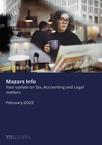
Mazars Info February 2022
PERSONAL INCOME TAX
Temporary increase from 130 to 180 tax-benefited overtime hours
Until December 2021, an existing tax relief was already granted to employees and employers for working overtime leading to a statutory overtime pay. Consequently, Belgian wage withholding tax benefits were applied for the first 130 overtime hours of the taxable period (depending on the percentage of legal overtime pay). In certain cases, this number of hours of overtime was even higher.
Nevertheless, in December 2021, several Royal Decrees have been published amending the existing Annex III of the RD/BITC 92 concerning the tax reduction of overtime. In this regard, the limit of 130 hours was raised to 180 overtime hours for the period from July 1, 2021, to June 30, 2023.
Furthermore, there is also an increase of the exemption of transferring a part of the wage withholding taxes to the Belgian tax authorities via the increased limit of 180 overtime hours.
As a result, an additional reduction and exemption of transferring a part of the Belgian wage withholding tax return has been granted during the abovementioned period. However, since this amendment has only been published in December 2021 while it applies retroactively as of July 2021, some employers will need to correct the corresponding Belgian wage withholding tax return.
In this respect, the Belgian administration has described how to report the (maximum) 50 additional overtime hours and even included several examples illustrating the practical processing of this overtime. Depending on whether it concerns overtime with an overtime bonus of 50% or 100%, or even an overtime bonus of 20%, the exemption will need to be reported in the (new) additional wage withholding tax returns (.58 or .59).
As a final note, employers must, in application of point 1 of Annex IIIter of the RD/BITC 92, keep a nominative list containing a number of data for each employee taken into account that the increase in the number of fiscally beneficial overtime hours is only temporary. This list can be requested by the Belgian authorities.
Limited flat-rate valuation for benefits in kind for heating and electricity
As from January 1, 2022, the possibility to apply a flat-rate valuation on the benefit in kind for the free provision of electricity and heating has been limited. As a result of the Royal Decree published on December 19, 2021, such flat-rate valuation based on article 18 §3 of the RD/BITC 92 will only be possible if these utilities (heating and electricity, other than for heating) are provided free of charge by the company that also puts the immovable property in this respect at the disposal of the employee/manager/ director.
This change in the law implies that the company must have the right in rem on the immovable property and then also make it available free of charge to its employee/ manager/ director. Consequently, the private person, may not hold the right in rem on the immovable property if he/she would like to benefit from a flat-rate valuation of the heating and electricity paid by the company.
As from income year 2022, the flat-rate valuation of the benefit in kind is the following:
- Directors/managers: 2.130 EUR for heating and 1.060 EUR for electricity (used for other purposes than heating);
- Employees: 960 EUR for heating and 480 EUR for electricity (used for other purposes than heating).
As a result, if the aforementioned condition of provision is not met, the benefit in kind on behalf of the employee/manager/director will, as of income year 2022, be calculated on the basis of the actual value, which, in practice, can be much higher than the previously granted flat-rate valuations. Therefore, a higher benefit in kind will be calculated on behalf of the beneficiary, who will be taxed proportionally.
PRIVATE PLANNING
Flemish registration duty revised: follow-up
In our previous newsletter of December 2021 we explained that changes were imminent regarding the registration duty; more specifically when purchasing an immovable property in the Flemish Region.
On December 29, 2021 this new legislation was published in the Belgian Gazette and became final.
As a result, the following has changed:
- As from January 1st, 2022: a reduction of the registration duty on the purchase of your sole own dwelling to 3% (or 1%);
- As from January 1st, 2022: an increase of the general rate to 12%; and
- Extinction of portability.
If you would like more information about this topic, we refer to our previous newsletter or contact us for advice.
Taxability of pensions in Belgium
In principle, a Belgian resident who receives foreign pension income will be taxed on this income in Belgium (being the state of residence). Usually the general progressive rate applies for recurring pension payments.
However, there was one type of recurring pension payments that could benefit from a special tax regime. It concerns pension promises that were accrued in the individual and definitive benefit of the employee or the manager, respectively before 2004 or 2006.
On condition that the recipient has not benefited a tax reduction in Belgium at the time of the accrual of this pension, these pension payments were deemed to be an annuity that belongs to the pensioner. Due to this, these pensions were only taxable in Belgium to the extent of 3% of the amount of accrued capital at the time of the first pension payment and the latter amount is then taxed at 30%.
Foreign pension income that meets the above conditions could, thus, benefit from this favourable tax regime.
Example 1: A person lived and worked in the Netherlands from 1980 to 2003. On January 1, 2019, he moved to Belgium. As a result of his employment in the Netherlands, he accrued a statutory pension as well as a supplementary pension of 500.000 EUR (accrued capital). It concerns a supplementary pension that has been accrued in the individual and definitive benefit of this employee. As he was not a resident in Belgium at the time the pension was accrued, he did not enjoy any tax benefit in Belgium.
On January 1, 2020, this person received a monthly payment of 1.500 EUR with regard to his statutory Dutch pension and a monthly supplementary Dutch pension of 2.000 EUR. The pension payments were taxed in Belgium as follows:
- Statutory pension payments: 18.000 EUR/year taxed at a progressive rate of 25-50%.
- Supplementary pension payments: 24.000 EUR/year with a taxable basis that amounts to 3% of the accrued capital, being 15.000 EUR, which is taxed at 30%.
However, the Belgian tax authorities were not happy with this advantageous taxation. A law amendment has been publicised in the Belgian Gazette on January 28, 2022, resulting in a change of law.
The modified law is applicable as of assessment year 2022 (income of 2021) and thus has to be applied as of the new tax return season this year. This has as a result that all such pension payments are taxable at the progressive rate of 25-50% (regardless of whether the contributions were made before or after 2004 or 2006).
Example 2: the information is identical to example 1, but now law amendment is taken into account. The pension payments, received on January 1, 2021, are taxed in Belgium as follows:
- Statutory pension payments: 18.000 EUR/year taxable at a progressive rate;
- Supplementary pension payments: 24.000 EUR/year taxable at a progressive rate;
Since both pensions, statutory and supplementary, are taxed at the progressive rate, they must be added together to determine the applicable tax rate. The sum amounts to 42.000 EUR and therefore these pension payments will (at least partially) be taxed at the highest rate of 50%.
As a result of the above amendment, there could be double taxation of pension payments. However, what the double tax treaty between the countries in question stipulates should be considered in each specific situation.
Please contact us for advice if you receive pension payments as mentioned above and want to know exactly what to expect.
VVPRbis-regime soon be tightened up
VVPRbis-regime in short
In principle dividends are subject to a withholding tax of 30% or taxed in the personal income tax return at a separate rate of 30%.
Pursuant to the VVPRbis-regime, dividend distributions made by small enterprises can benefit from a reduced withholding tax of 15% or 20%. The 20% rate applies if dividends are allocated in profit distribution of the second financial year after the year of contribution. The rate drops to 15% as from the third year.
The reduced tax rates only apply if the following conditions are cumulative met:
- The company must be a small company as defined in art. 1:24 §1 to 6 of the Company Code in the taxable period in which the capital contribution was made;
- The dividend must be related to new registered shares that have been issued as result of a contribution in cash as from July 1st, 2013;
- The shares are (except for a few exemptions) held in full ownership by the contributor(s) without interruption since the capital contribution;
- The origin of the contribution in cash may not derive from a capital reduction by a company affiliated or associated with the person of the contributor;
- The shares may not be preferent; and
- The contribution must be fully paid up at the time of the dividend contribution.
With a few amendments, the legislator wants to clarify some ambiguities and extended some conditions. What has changed?
- The legislator has clarified that the VVPRbis-regime applies to ‘new’ shares issued upon incorporation or upon later contributions to pre-existing companies.
- The condition regarding the origin of the contribution is extended: a contribution derived from a liquidation reserve subjected to a 5% tax rate cannot create VVPR-bis capital.
- The ambiguity regarding the meaning of ‘preferred shares’ has been clarified: the shares may not have preferential rights with regard to the participation in the capital or the profits, or with respect to the distribution of the company’s assets. This means that a multiple voting right or veto right will be permitted without loss of the VVPRbis-regime.
- The condition that the contribution must be fully paid up at the time of the dividend contributions can no longer be circumvented. Companies that have decided to waive the obligation to pay up between May 1, 2019 and December 15, 2021, are required to carry out a capital increase which will repair the amount of paid-up capital in cash back to the same level as the initial underwriting level, by December 31, 2022 at the latest. Otherwise, they will lose the VVPRbis-regime (partially).
The amendment law concerning the above changes in the VVPRbis-regime has been published in the Belgian Official Gazette on January 28, 2022. Nevertheless, the changes are applicable for dividends awarded or made payable as from January 1st, 2022.
If have any questions regarding the VVPRbis-regime or the amendments, please do not hesitate to contact us.
CORPORATE INCOME TAX
Belgian Tax Reform – what’s up in 2022 from a corporate income tax perspective
The new draft law on various tax provisions has been voted in plenary session on 13 January 2022. From a corporate income tax perspective, the following provisions are to be highlighted.
Reporting obligations on specific tax forms
The draft law provides now a legal basis for the reporting of income paid or attributed related to the use or concession of copy rights on specific tax forms 281.45. As a consequence, non-compliance with this mandatory reporting obligation will result in the application of a secret commission tax. The non-reported expense will remain deductible but will constitute a minimum tax base in the hands of loss-making companies. The new provision will apply for income paid or attributed as from 1 January 2021 in a taxable period relating to assessment year 2022.
On the other hand, by way of administrative simplification, the legal obligation to file tax forms 281.50 will no longer be applicable when a VAT compliant invoice has been issued by a taxable person located in the EEA territory. Additionally, by Royal Decree, a cap will be determined (with a maximum of 1.000 EUR per supplier per year) below which no reporting obligation will have to be met.
Finally, we do want to remind that as from 1 January 2021 (assessment year 2022) reimbursements of costs proper to the employer should be mentioned on tax forms 281.50 in order to escape the secret commission taxation (introduced by the so-called “pot-pourri law” of 27 June 2021).
VVPRbis-regime
We refer to the above article “VVPRbis-regime soon be tightened up”.
Recharging of limited deductible expenses
In a recent decision of the Supreme Court, the latter took the position that expenses related to the purchase of goods and services destined for resale, are always to be considered as professional expenses, i.e. the deductibility of these expenses does not have to be tested based on the general principles of deductibility laid down in article 49 of the Belgian Income Tax Code (“BITC”). In order to provide some legal certainty further to this case law, the draft law now explicitly provides that costs of commercial goods and services in the broadest sense are to be considered as professional expenses (new article 52, 13° of the BITC). As a consequence, limited deductible expenses (such as catering costs etc) being cross-charged by a supplier to the beneficiary of the goods or services are not to be subject to the deduction limitation in the hands of the supplier, to the extent these expenses are explicitly mentioned on the invoices. This is the confirmation of an existing administrative practice which will now be enacted in a new article 53/1 of the BITC (applicable as from financial year 2022). This principle will also apply in case the beneficiary of the goods or services is not subject to any deduction limitation (e.g. a private individual or a foreign company).
Belgian group contribution in combination with Dividends Received Deduction
The Belgian group contribution regime in its current design prohibits the dividends-received deduction (“DRD”) being deducted from the amount of the group contribution (article 205/5 of the BITC in combination with article 207, par 8 BITC). For instance, if company A, in addition to an operating loss of EUR100, also receives a dividend of 80 EUR from a subsidiary, its accounting result and initial taxable result will be a current-year loss of 20 EUR. The group contribution of 100 EUR agreed with company B increases company A’s tax base to 80 EUR. However, the DRD of 80 EUR cannot be deducted from the amount of the group contribution and so company A will be fully taxed on EUR80, ie the amount of the received dividend (The non-deducted DRD of 80 EUR can, however, be carried forward).
This can be considered as a breach of the EU Parent-Subsidiary Directive, which, in summary, provides that EU member states should refrain from taxing dividends distributed by EU subsidiaries to EU parent companies. Member States are free to decide how this is implemented in their national tax laws, i.e. by excluding the relevant dividend income from the taxable base of the taxpayer altogether (exclusion approach), or by first including the relevant dividend income in the taxable base and subsequently allowing for a deduction (inclusion and deduction approach). Nevertheless, based on the case law of the European Court of Justice, the choice for an inclusion and deduction approach should be neutral.
Based on the parliamentary documents, it could be expected that the current draft law would have put an end to the ongoing discussions in this respect. However, other than moving the content of article 207, par 8 BITC (together with other limitations on deductions of tax attributes) to a single article 206/3 BITC, the final text of the draft law, adopted on 13 January 2021, did not make any change to the deduction limitations.
This can be considered as a breach of the EU Parent-Subsidiary Directive, which, in summary, provides that EU member states should refrain from taxing dividends distributed by EU subsidiaries to EU parent companies. Member States are free to decide how this is implemented in their national tax laws, i.e. by excluding the relevant dividend income from the taxable base of the taxpayer altogether (exclusion approach), or by first including the relevant dividend income in the taxable base and subsequently allowing for a deduction (inclusion and deduction approach). Nevertheless, based on the case law of the European Court of Justice, the choice for an inclusion and deduction approach should be neutral.
Based on the parliamentary documents, it could be expected that the current draft law would have put an end to the ongoing discussions in this respect. However, other than moving the content of article 207, par 8 BITC (together with other limitations on deductions of tax attributes) to a single article 206/3 BITC, the final text of the draft law, adopted on 13 January 2021, did not make any change to the deduction limitations.
VAT
Latest news
As far as VAT is concerned, 2022 promises to be another year full of changes. Below, we will go through the novelties that will be in force as from 2022.
1. Adjustment of the VAT exemption for medical services
Traditionally, the Belgian VAT authorities gave a broad material scope to the exemption for medical services but limited the exemption to regulated medical professions. Following various judgments of the European Court of Justice, the legislator adapted the medical exemption. This new law came into force on 1 January 2022.
Consequently, the exemption does not only apply to the medical and para-medical professions. If it concerns a so-called therapeutical treatment with a medical objective, the exemption also applies for professions that were previously excluded like homeopathics, chiropractors, …
Moreover, the exemption is not applicable if treatments are not therapeutic even performed by (para)medics (like in some cases, plastic surgery).
The link between the RIZIV-nomenclature of refunded treatments acts only as a guidance, there is no direct link anymore.
The Authorities will assume that (para)medics perform therapeutical treatments. If this is not the case, it will be up to the (para)medic to apply for a VAT number. Obtaining a VAT-number means that the (para)medic will have to invoice patients with VAT but that she / he will also have a right to deduct VAT. It will also be possible to deduct the VAT of investments made in the past. We would be happy to discuss this further with you.
2. Adjustment of the VAT exemption for transport services upon export
We refer to our previous newsletter. The Belgian administration has complied with the European Commission’s request to implement the ruling of the European Court of Justice in the LC case and published a circular letter in which the VAT exemption for transport services linked to export is only applicable if they are performed for the consignor or the consignee of the exported goods. Consequently, transporters who subcontract transport for export can no longer invoke the VAT exemption.
Initially, the entry into force was foreseen on 1 January 2022, but a new circular letter published on 22 November 2021 postponed the entry into force until 1 April 2022.
3. Renovating at 6% - no longer an attestation, but an invoice statement!
For decades, builders have had to request a certificate from the owner confirming the age and use of the home on which the work was carried out in order to be able to apply the 6% rate. A new law (Law of 27 December 2021 containing various provisions on value added tax, Official Gazette 31 December 2021) replaces this additional administrative obligation from 1 January 2022 with the following statement on the invoice:
“VAT rate: In the absence of a written dispute within a period of one month from receipt of the invoice, the customer is deemed to acknowledge that
(1) the works are performed on a dwelling of which the first occupation took place in a calendar year that is at least ten/fifteen years prior to the date of the first invoice relating to those works,
(2) the dwelling, after execution of those works, is used exclusively or mainly as a private dwelling and
(3) the works are supplied and invoiced to a final consumer.
If at least one of these conditions is not satisfied, the standard VAT rate of 21 pct. applicable and the customer will be liable for payment of the tax, interest and fines due in respect of those conditions".
The contractor is no longer liable for the erroneous application of the reduced rate should the property not meet the age condition or the private use. The customer has one month to dispute the statement on the invoice.
In a transitional period until 30 June 2022, contractors may still use the attestation instead of the invoice statement.
4. Provision of furnished accommodation
As a result of a ruling whereby student houses that provided sufficient additional services qualified under the regime of 'providing furnished accommodation' subject to 6% VAT instead of the exemption for property rental, a change was also made to the exception to the exemption for property rental.
To still qualify as 'providing furnished accommodation' under the 6% rate, the duration of the stay must be a maximum of 3 months. The rental may not be purely passive. At least one of the following services must be provided: physical reception or provision of household linen and its replacement for a stay of more than one week or daily provision of breakfast.
Entry into force on 1 July 2022.
5. Flat-rate VAT scheme
The flat-rate VAT schemes will be phased out. As a result, it will no longer be possible to opt for the flat-rate for new businesses as of 2022. The definitive abolition for existing businesses will only take place as from 1 January 2028.
6. On the agenda?
Finance Minister Vincent Van Peteghem received the green light from Europe for extending the VAT reduction for demolition and reconstruction. This relief measure would normally run until 31 December 2022, but both the Flemish and federal authorities had already indicated that they were in favour of extending this period.
In addition, Europe has also given the opportunity to apply the reduced VAT rate to (electric) bicycles. The VAT reduction on the purchase of an (electric) bicycle was already unanimously adopted in the Parliamentary Committee on Finance in April 2019. The green light from Europe means that this bill could soon also be implemented in practice.
KEEP IN MIND THE DEADLINE !
VAT
- VAT return January 2022 : February 20, 2022
Personal income tax / Corporate income tax return
- Forms 325.10 & 325.20 (form 281.10 & 281.20) : February 28, 2022
- Request reimbursement or transfer of prepayment (personal/corporate) for income taxes : March 31, 2022





